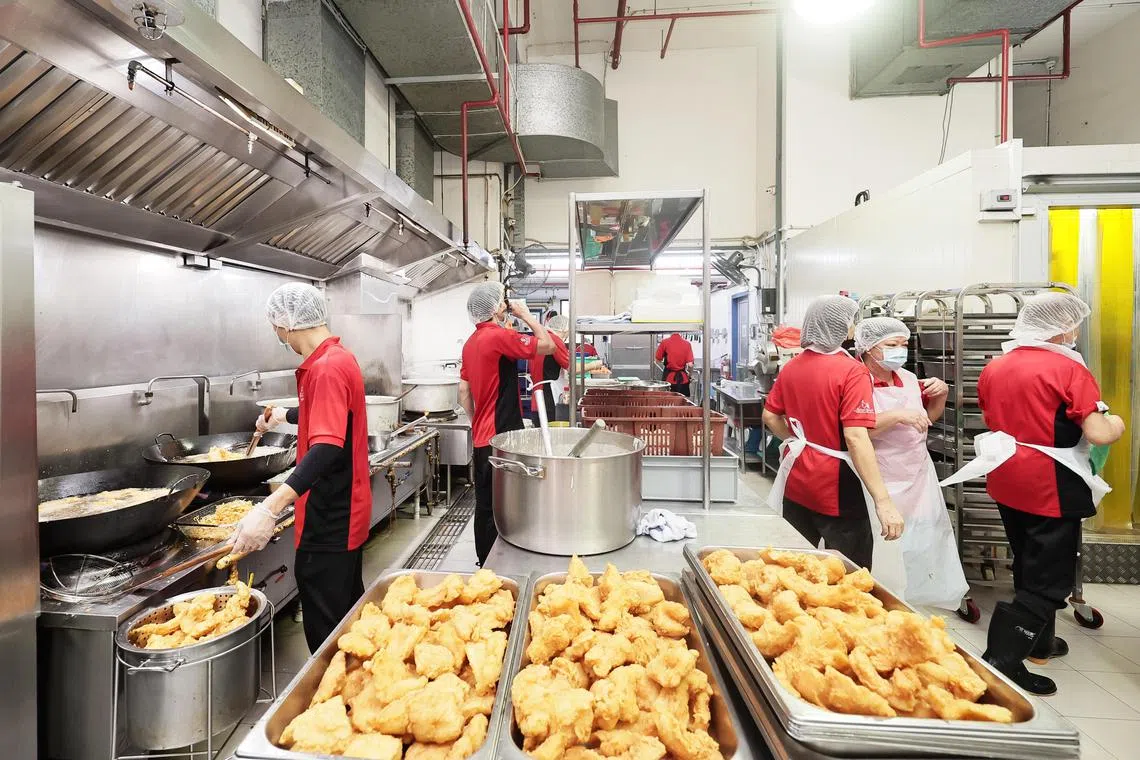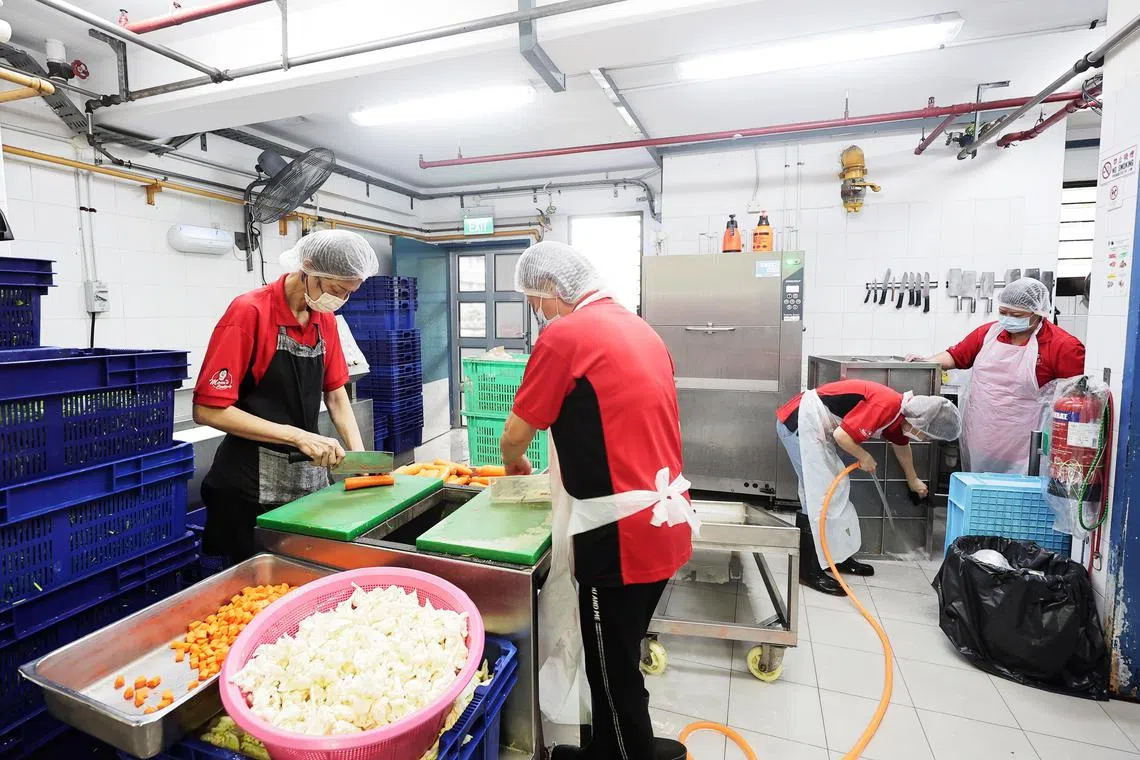Tingkat, catering businesses emphasise safety standards after Sakura Buffet’s licence cancellation
Sign up now: Get ST's newsletters delivered to your inbox

When food at tingkat company Mom’s Cooking has been cooked, it is stored in a warmer kept above 60 deg C before being packed into thermal containers and delivered to customers.
ST PHOTO: KELVIN CHNG
Follow topic:
SINGAPORE – Tingkat delivery and catering companies told The Straits Times they have strict measures in place to ensure food safety and quality.
These include discarding unused ingredients on a daily basis to ensure freshness, and employing food hygiene officers to oversee food production in central kitchens where food is prepared.
The issue came under the spotlight on May 10, when the Singapore Food Agency (SFA) cancelled the licence of catering firm Sakura Buffet following complaints about catered meals
Investigations found that all the meals had been supplied by Sakura Buffet, and that another seven online businesses were also linked to it. SFA said checks at Sakura Buffet’s premises in Geylang Bahru subsequently found food safety lapses such as dirty premises and the false labelling of timestamps on packed food.
One of Sakura Buffet’s former directors is also facing charges for allegedly owing workers some $430,000 in unpaid wages.
ST contacted 26 companies, five of which responded, to shed light on their food safety practices.
For instance, ingredients are delivered on a daily basis and extra ingredients are not used for subsequent meals in the interest of safety and freshness, said food hygiene officer Stanley Ng of tingkat business Homely Delights, which serves 200 meals a day.
Head chef Eugene Tan of confinement-focused tingkat business Tian Wei Signature, which serves 450 meals daily, said the company employs three certified Level 4 hygiene officers to consistently review and implement new food safety measures. Level 4 is the highest level of the Workforce Skills Qualifications food safety course.
Mr Jared Ng, manager of halal caterer Rilassi Catering, said: “We always have a food hygiene officer on-site and conduct audits on workers daily to ensure that they are not sick. When suppliers deliver raw or frozen food, we will check the expiration date.”
When food has been cooked, it is stored in a warmer kept above 60 deg C before being packed into thermal containers and delivered to customers, said Mr Kelvin Ong, who owns Mom’s Cooking, a tingkat company.
Mr Alvin Ong, the company’s executive chef, added: “All the food each chef cooks must pass through me for tasting. Because if our food is bad, it affects thousands of people, and we have the conscience to serve tasty and safe food.”
He said that different-coloured cutting boards are used for vegetables, raw meat and cooked meat to prevent food contamination.
Some companies also take extra steps to ensure food is delivered according to proper procedures.
Said Rilassi’s Mr Ng: “We have an in-house delivery service. As we are a halal company, we cannot ensure that the foods will be handled according to halal procedures when outsourced.”
Mr Veera Victor S., director of Indian catering and tingkat service company Brinda’s, said: “All our deliveries are in-house, unless it is peak period.”
During such busy periods, his company may tap external delivery drivers to fulfil orders.

At tingkat company Mom’s Cooking, different coloured cutting boards are used for vegetables, raw meat and cooked meat, preventing food contamination.
ST PHOTO: KELVIN CHNG
Mr Alvin Ong said: “All our chefs and delivery drivers have been with us for more than eight years. When a worker is loyal and experienced, we can rely on him to do the right procedures.”
In its statement on the cancellation of Sakura Buffet’s licence, SFA named the 12 online businesses linked to the company, many of which sold meals targeting specific dietary needs. These included confinement meals, vegetarian food and healthy meals for those watching their weight.
“Companies are trying to gain market share by creating multiple brands. Customers regularly change tingkat companies for a few months only to return,” said Homely Delights’ Mr Stanley Ng.
Mr Stanley Ng, who has been a food hygiene officer for more than eight years, added: “A central kitchen with a few brands can be safe, but more than 10 brands and it becomes a problem. Staff will be overstretched, struggle to handle the workload, and thus compromise on safety.”
He said that the incident involving Sakura Buffet has affected his company’s business, as one of the 12 linked businesses – Home Tingkat Catering – shares a similar name with that of his firm.
“When customers book our company, they ask whether we are related to Home Tingkat,” he said.
Mr Alvin Ong from Mom’s Cooking said: “These (suspended) companies tarnish our reputation and others in the tingkat industry. Consumers will lose faith in the tingkat industry. Companies who play by the rules and ensure safe food are at the suffering end.”
However, not all companies with multiple brands use shared kitchens. Firms such as Tian Wei Signature and ReLacto told ST they are under the same management, but operate from two separate kitchens as this allows for extra food storage and preparation space.
Madam Rosie Ching, 45, principal lecturer of statistics at the Singapore Management University, said that her confidence in the tingkat and catering industry will “take a beating” after Sakura Buffet’s suspension.
“(This is) especially when the customers don’t get to see the conditions under which the food is prepared and delivered,” she said.
She orders buffets from Elsie’s Kitchen, a catering company, more than 10 times a year. “My confidence (in the company) stems from repeated positive experiences with the trusted quality, variety and taste of its food, its professionalism in set-up, and friendly communication with the ordering process.”

